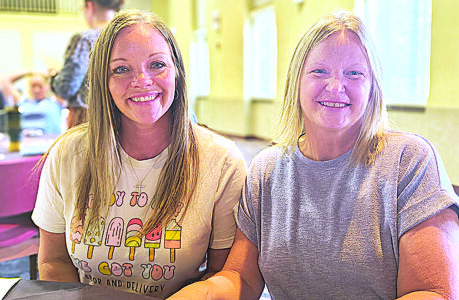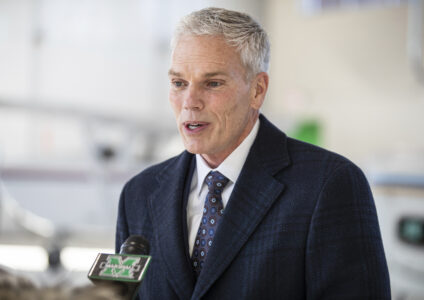Community Offers Ideas on Future West Virginia Drug Control Policy at Wheeling University

photo by: Shelley Hanson
Registered nurses Tashina Brothers, left, and Stacey Gilli attend the Community Conversation session Tuesday regarding the state’s drug control policy at Wheeling University.
WHEELING — Community members gathered Tuesday to offer their ideas about how substance abuse recovery could be improved in the Mountain State.
Dr. Stephen Lloyd, director of the West Virginia Office of Drug Control Policy, held the Community Conversation session at Wheeling University. He was introduced by Wheeling Police Chief Shawn Schwertfeger, who serves as chairman of the Law Enforcement Subcommittee of the Governor’s Council on Substance Abuse Prevention and Treatment.
Lloyd, a Tennessee native, said he started his journey to recovery 21 years ago. Entering treatment, at first, was simply a way for him to keep his medical license. But after seeing what the process was like for those younger than him and with lesser means, he decided he wanted his life’s work to be helping others recover from drug addiction.
“It was the best thing that ever happened to me in my life,” he said.
After working in the field in other states, he eventually landed in West Virginia — a state that has one of the most complete recovery systems in the United States, he said. However, improvements are needed.
“Our challenge today is how to tie it up,” he said.
One woman in the crowd said had worked in the recovery field previously and that people need more support during recovery. For example, she said, when people were ready to start getting sober, there was often no place to send them to.
Lloyd said this was a good point, because those who reach out for help need to get it within four hours, not in a few days when something is open. An acute stabilization unit, he said, would give people a place to go immediately until they could get into a treatment center.
Another woman expressed concern about new kinds of drugs being sold to underage children at gas stations. She said the items are very addictive.
A woman with Serenity Hills in Wheeling said she often has patients who have learning disabilities or brain injuries that need extra help after being treated for addiction. They cannot do it on their own.
One woman chimed in later and said there are group housing waivers for people with disabilities that people can apply for and get.
Another woman suggested that maybe assisted living facilities might be able to take in people in recovery. One wing of a complex could be dedicated to recovery and staffed appropriately.
Before the event began, Schwertfeger said three other sessions had been held across West Virginia. Schwertfeger noted the city of Wheeling’s crisis response units have been successful in getting people in treatment for drug abuse and mental health. The units respond with police to calls for service, such as an overdose, where special peer counselors talk to those who need help.
“As a result of that unit, and many other factors, we are seeing an astronomical reduction in crime,” he said. “In one month this year, those young ladies were successful in getting 18 people into treatment. That’s just one month and that’s 18 people who are no longer breaking into cars, homes or committing other crimes related to their addiction. And at the end of the day, we’re helping people.”
Before using the crisis response units, Schwertfeger said the city would annually see 200 to 250 annual overdoses, not overdose deaths but overall overdoses.
“If we keep tracking the way we are, we’re going to be at 80 overdoses this year,” he said. “That’s a significant reduction. Things could happen and it could blow up, but those are the kind of numbers we’re seeing.”




